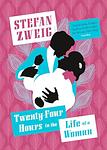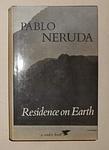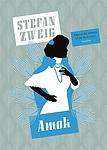The Greatest Chilean, Austrian "Fiction" Books Since 1900
Click to learn how this list is calculated.
This list represents a comprehensive and trusted collection of the greatest books. Developed through a specialized algorithm, it brings together 300 'best of' book lists to form a definitive guide to the world's most acclaimed books. For those interested in how these books are chosen, additional details can be found on the rankings page.
Genres
Countries
Date Range
Reading Statistics
Click the button below to see how many of these books you've read!
Download
If you're interested in downloading this list as a CSV file for use in a spreadsheet application, you can easily do so by clicking the button below. Please note that to ensure a manageable file size and faster download, the CSV will include details for only the first 500 books.
Download-
1. The Man Without Qualities by Robert Musil
"The Man Without Qualities" is a satirical novel set in Vienna during the last days of the Austro-Hungarian Empire. It follows the life of Ulrich, a thirty-two-year-old mathematician, who is in search of a sense of life and reality but is caught up in the societal changes and political chaos of his time. The book explores themes of existentialism, morality, and the search for meaning in a rapidly changing world.
-
2. The House of the Spirits by Isabel Allende
"The House of the Spirits" is a multi-generational saga that explores the lives of the Trueba family, set against the backdrop of political upheaval in an unnamed Latin American country. The narrative is driven by the family's strong and magical women, including clairvoyant Clara and her granddaughter Alba. The story spans over three generations, weaving together personal, social, and political threads, and is rich in elements of magical realism. The novel explores themes of love, violence, social class, and the struggle for power.
-
3. Death of Virgil by Hermann Broch
The novel explores the final hours of the Roman poet Virgil, who, while on his deathbed, contemplates the value and impact of his life's work, particularly his unfinished epic, the Aeneid. The narrative is a complex, stream-of-consciousness meditation on art, life, and death, with Virgil wrestling with his desire to burn his epic and the emperor's command to preserve it. The book delves into themes of the meaning of human existence, the role of art in society, and the clash between the individual's inner world and the external world.
-
4. The Savage Detectives by Roberto Bolaño
"The Savage Detectives" is a novel that follows the lives of two Latin American poets, Arturo Belano and Ulises Lima, who are founders of a literary movement called "visceral realism." The book is divided into three parts and is narrated by multiple characters, providing different perspectives on the protagonists. The narrative spans over 20 years, following the poets' journey from Mexico City to Europe, Israel, and Africa, as they search for a mysterious poetess and navigate through the world of literature, sex, drugs, and the complexities of life.
-
5. 2666 by Roberto Bolaño
The novel is a sprawling, ambitious work that spans continents and time periods, centering around an elusive, reclusive German author. It intertwines five different narratives: a group of European academics searching for the author, a professor in Mexico dealing with his own personal crises, a New York reporter sent to cover a boxing match in Mexico, an African-American journalist in Detroit, and the horrifying and unsolved murders of hundreds of women in a Mexican border town. The narratives are linked by themes of violence, mystery, and the search for meaning in a chaotic world.
-
6. The Confusions of Young Törless by Robert Musil
This novel explores the moral and psychological development of a young student sent to a military boarding school in Austro-Hungarian Empire. The protagonist witnesses and participates in the bullying and humiliation of a fellow student, leading him to question the nature of power, morality, and the thin line between civilization and barbarity. The book is a profound exploration of adolescence, authority, and the loss of innocence.
-
7. The Radetzky March by Joseph Roth
"The Radetzky March" is a historical novel that explores the decline and fall of the Austro-Hungarian Empire through the experiences of the Trotta family, across three generations. The narrative begins with Lieutenant Trotta, who saves the life of the Emperor during the Battle of Solferino, and follows his descendants as they navigate the complexities of life in the empire. The novel delves into themes of duty, honor, and the inevitability of change, painting a vivid picture of a society in decline.
-
8. The Royal Game by Stefan Zweig
"The Royal Game" is a gripping novella about a man who, while in solitary confinement by the Nazis, steals a book of past chess games and plays them all in his mind to keep his sanity. Once freed, he becomes a chess master but his mental state is fragile. On a cruise ship, he is challenged to a game by the reigning world champion, leading to a psychological battle that pushes him to the brink of madness.
-
9. The Sleepwalkers by Hermann Broch
"The Sleepwalkers" is a trilogy that explores the psychological transformation and moral decay of German society between 1888 and 1918. The narrative follows three main characters: Joachim von Pasenow, a romantic military officer; August Esch, a pragmatic bookkeeper; and Claus von Pasenow, an intellectual and World War I soldier. The book uses these characters to depict the shift from a stable, traditional society to a modern, aimless one, examining the individual's struggle with societal change and the disintegration of values.
-
10. Correction by Thomas Bernhard
"Correction" is a complex narrative revolving around the life of a man named Roithamer, a genius obsessed with constructing an architectural masterpiece, the Cone, in the center of the Kobernausser forest. The story is told through the perspective of his friend who is reading Roithamer's notes after his suicide. The novel explores themes of obsession, isolation, and the pursuit of perfection, while also delving into the protagonist's troubled relationships with his family and society.
-
11. The Piano Teacher by Elfriede Jelinek
"The Piano Teacher" is a dark exploration of power dynamics, sexuality, and repression. The story revolves around a piano teacher at a prestigious music school in Vienna who lives with her overbearing mother in a state of emotional and sexual repression. Her life takes a turn when she becomes sexually involved with a young, self-assured student. The relationship, marked by sadomasochistic games and emotional manipulation, spirals out of control, leading to a tragic end. The book is a profound critique of bourgeois values and the oppressive structures of society.
-
12. Extinction by Thomas Bernhard
"Extinction" is a novel that explores the dark and complex themes of family, identity, and history through the eyes of its protagonist, a professor living in Rome. When he receives news of the deaths of his parents and brother in a car accident, he is forced to confront his past and his Austrian heritage. The narrative delves into his thoughts and feelings, his criticisms of his family and society, and his philosophical musings on life and death, all while he prepares to return to his family's estate for the funeral. The novel is renowned for its dense, stream-of-consciousness style and its unflinching examination of the human condition.
-
13. The Forty Days Of Musa Dagh by Franz Werfel
This novel is a gripping historical fiction that recounts the harrowing tale of Armenian villagers who resist their deportation by the Ottoman Empire during the Armenian Genocide of 1915. Centered around the heroic stand of the people of Musa Dagh, the narrative delves into the struggle for survival, unity, and defiance against overwhelming odds. Through the lens of this resistance, the book explores themes of identity, resilience, and the human spirit's capacity to fight for freedom and justice. It serves as a poignant reminder of a dark chapter in history, highlighting the courage and determination of those who fought against their oppressors.
-
14. Concrete by Thomas Bernhard
The book is a darkly introspective narrative that delves into the mind of a reclusive, obsessive intellectual who is struggling to complete his scholarly work on the composer Mendelssohn. As he grapples with his own ailments and the perceived mediocrity of his surroundings, the protagonist's stream-of-consciousness monologue reveals his deep-seated anxieties, self-loathing, and profound isolation. The narrative is a relentless examination of the protagonist's psyche, showcasing his critical view of society and his own personal relationships, which are fraught with tension and dysfunction. Through this, the novel explores themes of artistic creation, intellectual elitism, and the suffocating nature of expectations and familial obligations.
-
15. Woodcutters by Thomas Bernhard
Woodcutters is a darkly humorous critique of Vienna's artistic elite. The story takes place over the course of a single evening, as the narrator attends a dinner party in honor of a recently successful actor. As the evening progresses, he reflects on the pretentiousness and hypocrisy of the guests, the mediocrity of their artistic achievements, and the tragic suicide of his former lover. The novel is a scathing indictment of the vanity and self-delusion of the artistic community.
-
16. Twenty Four Hours In The Life Of A Woman by Stefan Zweig
The novella delves into the intense emotional landscape of a middle-aged English widow who, while staying at a Riviera resort, becomes deeply fascinated by the plight of a young man consumed by a gambling addiction. Over the course of a day, their lives intertwine, leading her to reflect on the nature of obsession and the fleeting moments of passion that can irrevocably alter one's life. As she recounts her own story of moral and emotional upheaval, the narrative explores themes of societal expectations, personal liberation, and the profound impact of ephemeral encounters.
-
17. The Wall by Marlen Haushofer
The book is a profound exploration of isolation and survival, following a woman who finds herself unexpectedly cut off from the rest of the world by an invisible, impenetrable wall. With the rest of humanity seemingly vanished, she must come to terms with her solitary existence in a remote forested area, accompanied only by a few animals. As she adapts to her new reality, tending to the land and the creatures that become her companions, the narrative delves into themes of self-reliance, the intrinsic connection between humans and nature, and the resilience of the human spirit in the face of unimaginable circumstances. Through her introspective journey, the protagonist examines the essence of her being and the meaning of life when stripped of society and its constructs.
-
18. Residence on Earth by Pablo Neruda
"Residence on Earth" is a collection of poems that delve into the human condition, exploring themes of love, despair, loneliness, and the search for identity and meaning. The poems are characterized by their deep introspection, vivid imagery, and profound emotional resonance. The author's unique style combines surrealism, historical allusions, and a keen observation of the natural world, resulting in a powerful and evocative exploration of the human experience.
-
19. Confusion by Stefan Zweig
"Confusion" is a compelling narrative that explores the intense and passionate relationship between a student and his charismatic professor. Set in the early 20th century, the story unfolds as the protagonist becomes entangled in the professor's personal life, discovering his mentor's secret past, his struggling marriage, and his hidden homosexual desires. The book presents a profound exploration of human emotions, identity, and the complexities of love, against the backdrop of the societal norms of the time.
-
20. Beware Of Pity by Stefan Zweig
The novel explores the complex emotions and consequences that arise when a young lieutenant, succumbing to societal pressure, feigns romantic interest in a disabled young woman. His pity-driven actions lead to an entanglement of obligation, guilt, and false hope, ultimately culminating in a tragic series of events. Set against the backdrop of the Austro-Hungarian Empire on the brink of World War I, the story delves into the psychological depths of its characters, examining the moral dilemmas and the devastating impact of pity when it is mistaken for love.
-
21. Of Love and Shadows by Isabel Allende
Set against the backdrop of a South American country under a military dictatorship, this novel follows the story of a woman journalist and her lover, a photographer, who, while working together, uncover a hidden mass grave in a remote part of their country. Their discovery leads them into danger as they try to expose the truth about the brutal regime ruling their country, while also dealing with their own personal issues and their growing love for each other. The story is a blend of romance and political drama, showing the power of love and courage in the face of oppression and fear.
-
22. The Guiltless by Hermann Broch
"The Guiltless" is a novel that explores the disintegration of values and the rise of fascism in Germany between the two World Wars. It follows the lives of several characters, including a businessman, a musician, and a murderer, whose stories intertwine to paint a picture of a society in moral and social decline. The narrative delves into their personal struggles and moral dilemmas, reflecting the broader societal issues of the time and offering a critique of the political climate that allowed for the rise of totalitarian regimes.
-
23. Amok by Stefan Zweig
"Amok" is a novella that delves into the mind of a European doctor, who, while working in the Dutch East Indies, becomes obsessed with a wealthy and married female patient. The doctor's fixation spirals into a dangerous and self-destructive passion after she asks him to perform an illegal abortion. The story is a psychological exploration of obsession, guilt, and moral boundaries, told through the doctor's confession to a stranger during a ship journey.
-
24. The Left-Handed Woman by Peter Handke
"The Left-Handed Woman" is a poignant, introspective novel that explores the life of a woman who decides to live alone after her husband leaves on a business trip. She attempts to find her own identity and independence by distancing herself from her usual social circles, including her young son. The novel is a deep dive into her thoughts, feelings, and experiences as she navigates her new life, offering a profound exploration of solitude and self-discovery.
-
25. Weights And Measures by Joseph Roth
"Weights and Measures" is a poignant narrative that delves into the life of a conscientious imperial weights and measures inspector, who is uprooted from his contented existence in the city to a remote border town. In this new environment, he struggles with the corruption and indifference of the local merchants, which stands in stark contrast to his own principled nature. His sense of duty and his quest for justice become increasingly burdensome, leading to a profound personal crisis that reflects the broader decay of societal values in a world on the brink of great change and upheaval.
Reading Statistics
Click the button below to see how many of these books you've read!
Download
If you're interested in downloading this list as a CSV file for use in a spreadsheet application, you can easily do so by clicking the button below. Please note that to ensure a manageable file size and faster download, the CSV will include details for only the first 500 books.
Download























